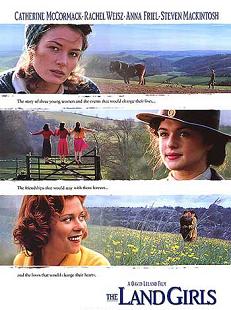
THE LAND GIRLS
UK, 1996, 111 minutes, Colour.
Catherine Mc Cormack, Rachel Weisz, Anna Friel, Steven Mackintosh.
Directed by David Leland.
The Land Girls is a memoir of World War Two, fifty years later. It focuses on the young women who enlisted in order to do the men’s work as they were away fighting the war. These women worked on the land, as did so many others in the munitions factories. This changed the face of the workplace after World War Two with the role of women and their proving that they could work in any situation.
This film takes place on the land in Dorset. Three girls are the focus of the film: Catherine Mc Cormack (who had just been Mel Gibson’s ill-fated wife in Braveheart), Rachel Weisz at the beginning of her career (Oscar winner 2005 for The Constant Gardener) and Anna Friel was appearing in soap operas before moving into film.
The film is an interesting look at the work of the land girls. However, it is something of a dramatic soap opera in the focus on their relationships. There is a melancholic tone underlying the film, especially with the men who are killed in war as well as relationships which were not fulfilled.
The film was directed by David Leland, better known for his comedies, Personal Services and Wish You Were Here.
1.A memoir? Fifty years after the war? A tribute to the land girls?
2.The re-creation of period, the British countryside, beauty, the farms, farming, the town, the dances? Period atmosphere? Musical score, songs?
3.The title, the girls in the War Service, the role of women, the changing role of women, doing men’s work during the war? A change of attitude towards women and work after World War Two?
4.The focus on the three women, their differences, backgrounds, differences in class, manners, moral perspective? The backgrounds of relationships or lack of relationships? The arrival, the farmer meeting them, his negative attitude, his wife and the welcome, settling into the room?
5.The attitude of the farmer, the contrast with his wife, with his son? His being sullen, the meals, silence, the demands, not giving Stella any leave, his wife becoming ill, the arguments with his son, Stella and the ploughing of the field and his change of attitude?
6.The son, his attitude, wanting to get away from the farm, joining up, hopes to be a pilot? At work in the fields, the meals? The meeting with Prudence, the sexual encounter? The tension with Stella? Negative? Ag, her interest, asking about the sexual encounter? His changing, the dance, drinking? His test for the air force, his failure, his anger? Stella and the visits of his fiancée, hoping for the wedding? His farewell to Stella, waiting at the station for her return? The years passing, marrying his girlfriend, the children? His life – what it was, what it might have been?
7.Stella, the focus on the film, her engagement to Philip, a serious young woman, at work, the way she spoke, with the farmer, with his wife, with Prudence and Ag? The clashes with the son? Her visit to her fiancé, lying about her period? Her falling in love with the son, hopes for marriage? Philip, his being wounded, going to see him, her reaction, loss of his limbs? Her not returning? The marriage, the divorce, revisiting the family? What her life might have been?
8.Prudence, chatter, bold, relationship with men, the liaison with the son, dancing, flirting, marrying the young man, his sudden death and her grief? Settling down, marriage, family?
9.Ag and her reserve, snobbishness, at work, looking at the son, meeting the Canadian at the dance, charmed by him, asking the son about the sexual encounter, the reaction? Her finally marrying – and the aftermath? Settled?
10.The portraits of ordinary people, the situation in the war, change?